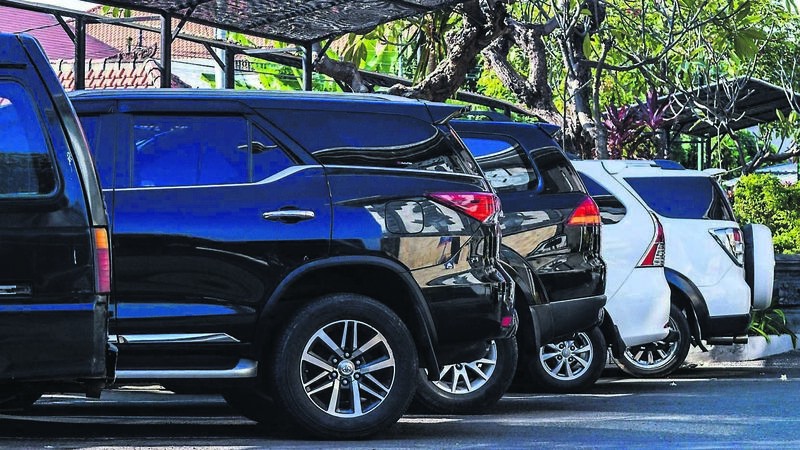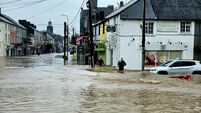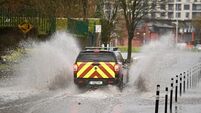Bigger not better as SUVs clog up roads

DESPITE concerns about their environmental impact, 55,000 SUVs were sold in 2021, or 55% of all new cars.
DESPITE concerns about their environmental impact, 55,000 SUVs were sold in 2021, or 55% of all new cars.
Environmentalists have been calling on policymakers to tax or ban SUVs, but rural politicians don’t want these taxes to affect people in the countryside, who use SUVs for farm work and for carrying large families, while urban dwellers buy SUVs as a status symbol.
Hannah Daly and Vera O’Riordan, researchers at the University College Cork’s (UCC) Environmental Research Institute, said that SUVs’ greater weight and height mean that they emit around 20% more carbon dioxide than medium-sized cars, and far more than electric vehicles.
Speaking in the Dáil in September, Ms Daly said: “Larger cars require more energy and emit more CO2, because of a few factors.
“The greater mass requires more energy to move, the size and shape cause less favourable aerodynamics; these cars create more drag, and greater material requirement creates larger embodied carbon emissions at the manufacturing stage.”
Oliver Moran, a Green Party councillor for Cork City northeast, told The Echo: “Even putting aside the climate issues, the increasing size of cars is a phenomenon in the city that’s causing problems for on-street parking, congestion, and especially safety.
“I grew up in the countryside, and jeeps, as we used to call them then, were work-and-agricultural vehicles owned by big farmers. Now, two thirds of all new passenger-car sales in Ireland are SUVs, whether it’s in the countryside or in the city, and we’re way ahead of the European average.”
He said: “There is a misconception, I think, that they’re safer to drive, but we’ve known for a long time that the opposite is true: SUVs were among the most dangerous vehicles to drive on Irish roads this year, alongside even motorcycles.”
Passengers in an SUV are more likely to die in an accident and SUVs are dangerous to pedestrians, including children, who are far more likely to die when struck by an SUV than by a smaller vehicle.
“Personally, I don’t think they’re a good investment,” Mr Moran said, adding: “We simply can’t all be driving SUVs, particularly in a city that’s planned to grow by 60% in the next 20 years.”
The UCC experts suggest that “the SUV problem” be handled like the smoking ban: Via taxation, education, and exclusion, all of which will require “bold action from policymakers”.
The first would consist of a system similar to the weight-based vehicle tax in France, where an extra €1,000 is charged for every 100kg a car weighs over 1,800kg and it is intended that the threshold be reduced to 1,600kg next year.
The second, education, would involve regulation of the marketing of SUVs, such as climate warnings on car ads, which Ms Daly and Ms O’Riordan say is “an intervention that could be introduced here, like health warnings on cigarette packets and public-health campaigns discouraging their sale and use”.
Finally, exclusion would either be a ban on SUV sales for non-commercial uses, or from entering cities, given the additional danger they pose to cyclists and pedestrians. This would discourage people from buying them.
Mr Moran also pointed to the French taxation system, saying: “The recommendation to the Government ahead of Budget 2024 was that our current motor-tax rates roughly equate to a weight-based system, but that this may need to change as vehicles evolve.”
He was also in favour of information on the danger of SUVs being included in marketing, saying: “I think education has to be a part of it, not least so that people aren’t caught unawares by measures that may need to come in to tackle the phenomenon.”
Mr Moran said that better public transport was the alternative to buying large cars. “It’s why we’re putting so much energy into upgrading public transport and other modes of travel: That alternative has to be there and realistic for people.
“So the focus has to be on plans like BusConnects and upgrading the commuter rail system, as well as walking and cycling infrastructure, so that we operate like people expect in a city.”
Mr Moran said: “Already, the Cork Metropolitan Area Transport Strategy envisions that a congestion charge will be considered for the city centre some time between now and 2040, as public transport improves.
“That’s probably a long way off, but, before then, something that could be considered is to vary car-parking charges based on the size of cars. That’s been called for in Dublin already and SUVs will pay higher parking charges in Paris from January this year,” he said.
While the discussion in government centres on SUVs’ use in cities, with the UCC researchers highlighting the large numbers of these cars sold in Dublin, people in rural areas often need larger cars.
Christopher O’Sullivan, Fianna Fáil TD for Cork South West, said in the Dáil that “defending SUVs is difficult”, but added that “families, particularly larger families, benefit from having bigger cars, because it is far more convenient”.
Mr O’Sullivan, who is also the party’s spokesperson on environment, climate action, and biodiversity, told The Echo that while regulation on the vehicles was necessary, it was important to ensure that “rural dwellers wouldn’t be unfairly disadvantaged. There are those who need jeeps to pull a cattle trailer in rural Ireland, and you have carpooling to school or families with three or four kids and there isn’t public transport or active travel (walking or cycling).
“If public transport and active travel were at the level they need to be in West Cork, then the taxation issue could be looked at,” Mr O’Sullivan said, adding that “people in rural Ireland have more impositions on them, with cost of fuel and diesel increases, and they can’t just jump on public transport or get taxis.
“Certainly, the taxation of SUVs should be looked at, firstly, to reduce emissions and, secondly, because there are well-documented health-and-safety issues with larger vehicles,” Mr O’Sullivan said, explaining that higher bonnets mean drivers are less likely to see a pedestrian or cyclist, plus the heavier weight means the damage is worse if there is a collision.
He suggested that city taxes could be looked at for urban dwellers whose SUVs are just sitting still, and said that overall exclusion of SUVs “is a step too far”.







 App?
App?


